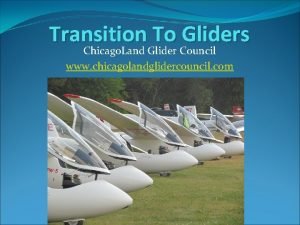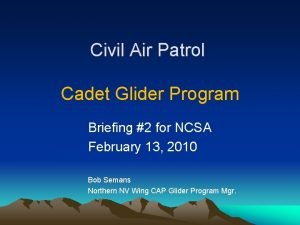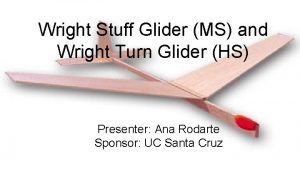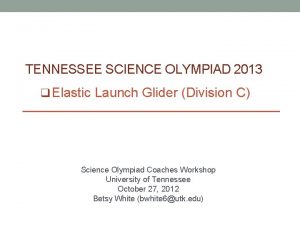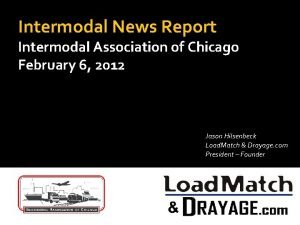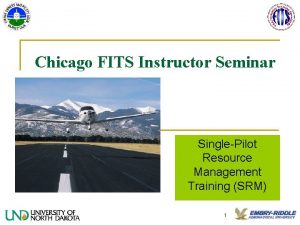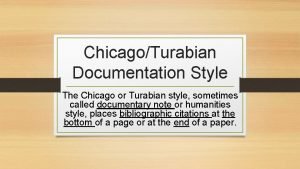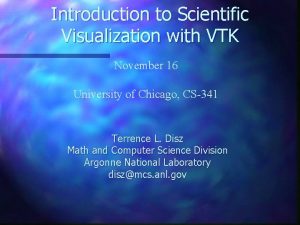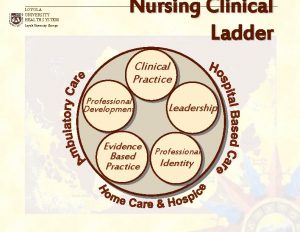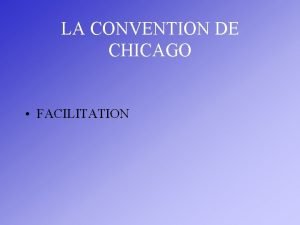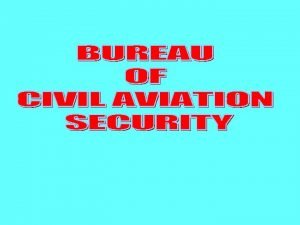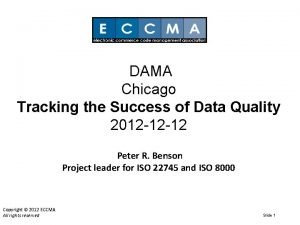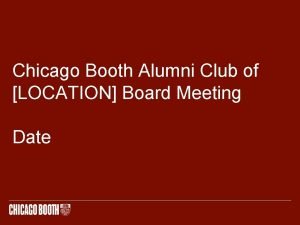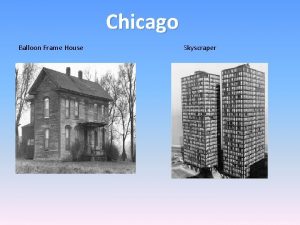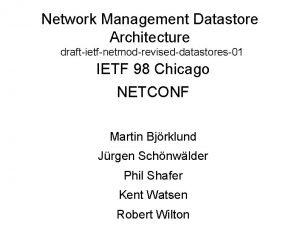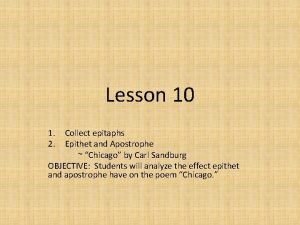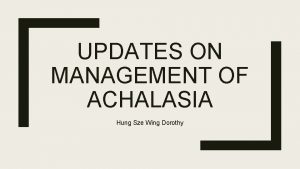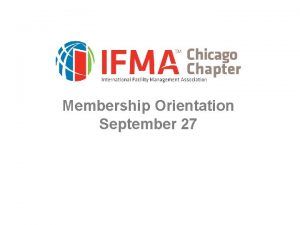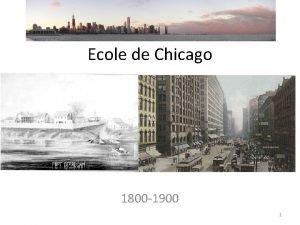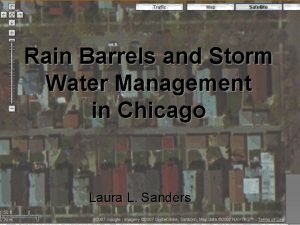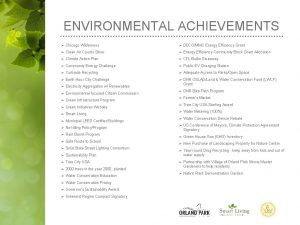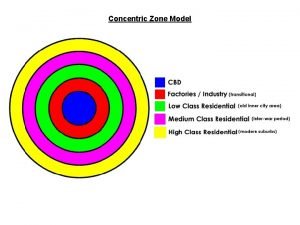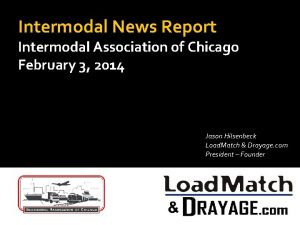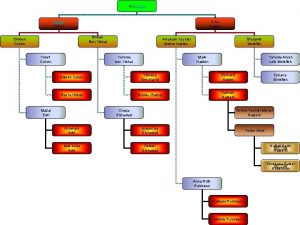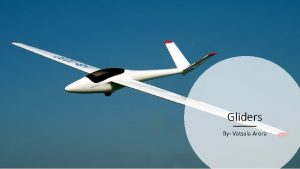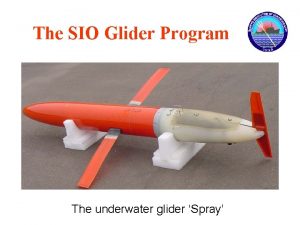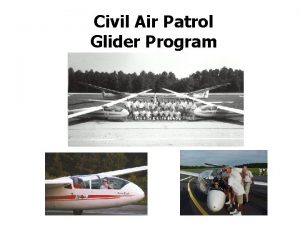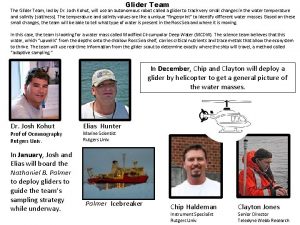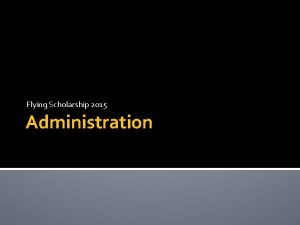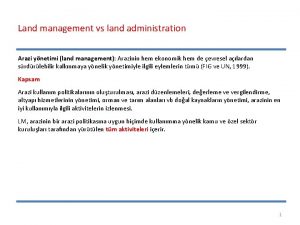Transition To Gliders Chicago Land Glider Council www























































































- Slides: 87

Transition To Gliders Chicago. Land Glider Council www. chicagolandglidercouncil. com

Presenters John Baker FAA Certificates: Flight Instructor Glider Ground Instructor Advanced Commercial Pilot Glider Civil Air Patrol Operations Qualifications: Glider Pilot Orientation Pilot Flight Instructor Check Pilot Examiner Michael (Mike) Vaughn FAA Certificates: Flight Instructor Airplane Single And Multiengine Glider Ground Instructor Advanced Instrument Commercial Pilot Airplane Single Engine Land Airplane Multiengine Land Instrument Airplane Glider Senior Parachute Rigger Back Chest Civil Air Patrol Operations Qualifications: Glider Pilot Orientation Pilot Flight Instructor

Why a Glider? Learn Something New Flying closer to “like a bird” Flying a glider takes the mystery out off power off landings Learn to manage the energy better when landing Lean to fly more coordinated to have longer flights Learn tight Formation Flying

Background on Gliders Age to solo a glider (14) vs drive a car or solo in an airplane. AOPA Flight training magazine Dec 2009 – What else can you do? Do I need a current medical or Drivers License? Do I need a student pilot certificate? Do some gliders have motors? How safe is it? Position of the United States Air Force Academy

The one fatality in Illinois between 1/1/2002 and 12/31/2012 NTSB Factual – Accident on 7/4/2010. Physician treating the pilot indicated that he was: Under treatment with tablets and injections for diabetes, Medication for attention deficit disorder, Medication for anxiety. Prescribed a continuous positive airway pressure (CPAP) device for sleep apnea.

One fatality in Illinois between 1/1/2002 and 12/31/2012 From NTSB Probable Cause : On-scene examination of the wreckage revealed no preimpact anomalies that would have precluded normal operations, The investigation could not determine what role, if any, the pilot’s medications or medical conditions may have played in the accident.

The United States Air Force Academy Colonel; Joseph L. Coates USAF (Retired) pioneered the “Soar for all program”. When asked why? “I was charged with ensuring that all cadets were thoroughly schooled in the basic principals of flight before they ever advanced to specialized flight training. I could think of no aircraft more practical, economical and motivational than a glider”

“Miracle on the Hudson” US Airways jetliner lost power and landed soon after takeoff in New York’s Hudson River on January 15, 2009.

The United States Air Force Academy Capt. Chesley B. “Sully” Sullenberger, graduated from the Air Force Academy in 1973. Sullenberger served as a glider pilot instructor at the Air Force Academy.

United States Air Force Academy

United States Air Force Academy

What's required by the FAA?

FAR/AIM – Knowledge Test Required? Sec. 61. 63 Additional aircraft ratings (b) Additional category rating. An applicant who holds a pilot certificate and applies to add a category rating to that pilot certificate: (5) Need not take an additional knowledge test, provided the applicant holds an airplane, rotorcraft, powered-lift, or airship rating at that pilot certificate level.

FAR/AIM – Transition Pilot Sec. 61. 109 (f) For a glider category rating. (1) …not logged at least 40 hours of flight time aircraft, …must log at least 10 hours of flight time in a glider. . . (i) 20 flights in a glider. . . (ii) 2 hours of solo flight time in a glider. . . , with not less than 10 launches and landings being performed. (2) …logged at least 40 hours of flight time in a heavier-than-air aircraft, …must log at least 3 hours of flight time in a glider. . . (i) 10 solo flights. . . and (ii) 3 training flights with an authorized instructor. . .

FAR/AIM – Transponder 91. 215 ATC transponder and altitude reporting equipment and use. (1) All aircraft. In Class A, Class B, and Class C airspace areas; (2) All aircraft. In all airspace within 30 nautical miles of an airport listed in appendix D, section 1 of this part from the surface upward to 10, 000 feet MSL;

FAR/AIM – Transponder Sec. 91. 215 (b) All airspace… (5) All aircraft except any aircraft which was not originally certificated with an engine-driven electrical system or which has not subsequently been certified with such a system installed, balloon, or glider—

FAR/AIM – Towline § 91. 309(3) The towline used has breaking strength not less than 80 percent of the maximum certificated operating weight of the glider. . . and not more than twice this operating weight. However, the towline used may have a breaking strength more than twice the maximum certificated operating weight of the glider…if— (i) A safety link. . . at the. . . glider. . . with a breaking strength not less than 80 percent of the maximum certificated operating weight of the glider. . . or greater than twice this operating weight; (ii) A safety link. . . at the. . towing aircraft with a breaking strength greater, but not more than 25 percent greater, than that of the safety link at the towed glider. . . end of the towline and not greater than twice the maximum certificated operating weight of the glider

Let’s Get Ready to Fly

Gliderport Operations Are there extra steps when pre-flighting a glider? Positive control check Remove External Equipment - tail dolly, wingtip wheels, aileron, rudder, elevator locks and pitot tube cover What about the towrope (a. k. a. towline)? First thing you do after attaching the towrope to the towplane and glider.

Positive Control Check

Towline How long? FAA Glider Flying Handbook Page 8 -2 . . . use a towline of adequate length— 200 feet is the minimum length for normal operations. A longer towline provides more isolation from towplane wake during aerotow launch. Short towlines, on the other hand, keep the glider closer to the towplane and its turbulent wake, complicating the problem of controlling the glider

Does a “Wing Runner” pick up the wing and run with it?

Wing Runner Get’s by standers outside the wing tip Shows Glider Pilot the ring on the rope and gets approval Attaches ring on rope to glider Motions for tow plane to take up the slack Motions for the tow plane to stop Waits for thumbs up from glider pilot that he is ready Does visual check that Airbrake is closed Scans sky for traffic in pattern Lifts wing After pilot starts to waggle rudder, motions to begin takeoff Runs a few steps with wing

Wing Rings to attach to the Glider

Blanik Tow Hook

Schweizer Tow Hook

Once rope is attached…

Visual Signals Glider Pilot Thumbs up Ready for take off - Rudder waggle Wing Runner Open and close Tow Hitch Take up slack Slack has been taken out/Hold position Tow Pilot Release now Check your configuration

Signal to glider

Signal Towplane to take up slack

Signal Towplane to take up slack

Signal Towplane to stop taking up slack

Glider pilot signals they are ready with a thumbs up

Wing runner lifts the wing

Glider pilot signals to tow place that he is ready

Wing runner also signals to Towplane that glider is ready

Towplane confirms that glider is ready for takeoff

Towplane confirms that glider is ready for takeoff

Wing runner

Emergency Stop

Taking off on Tow Who takes off first? Emergency plan Risks include: Configuration Not preflighted Rope Break

Who takes off first?

Flying on Tow Flying in Formation Turns on Tow – Arc of Turn and Aim point during turns Does the planes wake cause issues for the glider? Introducing rope slack How to take out slack rope. Steps prior to release Which way does the tow plane and glider turn

Flying on Tow

Flying on Tow

High Tow

Low Tow

Turns on Tow Arc of Turn and Aim point during turns

Blanik Interior

Tow Release Handle

Pulling Tow Rope Release

Towplane makes a 90 degree turn to the left

Glider makes a 90 degree turn to the right

Glider Traffic Pattern What can I learn? Are there go arounds? You will learn the discipline of making a dead-stick landing everytime. Now that I can make the runway are there PTS standards on where I should stop? Yes 200 feet for Private and 100 foot for Commercial. Practicing downwind landing. When you can make the glider port but not with enough altitude for normal pattern.

Glider Traffic Pattern Altitude at IP for 45 degree entry leg – 1, 000 What is FUSTALL What if I am high – What if I am low in downwind? How do I control energy in the pattern without a throttle? Spoilers and Airbrakes vs. slips

Blanik Interior

Blanik Rudder Pedals

Blanik Trim Tab Control

Blanik Trim Tabs

Blanik Spoiler Control

Blanik Spoiler Control

Blanik Brake Handle

Blanik Landing Gear Handle

Emergencies Ropebreak or towplane issue during initial rollout. Ropebreak after take off? Towplane issue What if you can’t release the tow rope? What if you can’t make it back?

Advanced landings Short Field Without altimuter

What if you can’t make it back?

Find a spot to Land Out

Just Landed

Wait for support crew

What is used to control energy in a typical training glider? Wheel Brakes Front Skid Yaw String Drag Less drag Increased drag

Yaw String (points to the pedal to step on) Inclinometer (step on the ball)

Glider Yaw String

Glider Aerodynmacs What is different about flying a glider? Longer wings causes more ground effect on take off and landing Induced drag is greater because of the longer wings in a glider Over banking more lift on outside wing which is stronger because it is longer

Glider Polars and Speed to Fly Best Glider is also called best L/D What is a glider Polar Minimum Sink Speed to fly in a headwind What is the rule of thumb if you do not have a polar

Glider Polar

Glider Variometer

Slow Flight, Stalls and Maneuvers Proximity to Airport during training Stalls are like Power off stall in an airplane How to recover from a stall in a glider Are spins required for a Private or Commercial Glider add-on? Steep turns 45 degree bank, unlike power maintaining altitude is not required.

Weather for Soaring Bumpy Air - Updrafts from surface heat (Thermals) Downdrafts Cumulus clouds Blue sky soaring – soaring birds, dust devils, rising dust, smoke If I hit sink is their lift near by? How to work the lift in a thermal Which direction to turn in a thermal? How can I tell if I am centered in a thermal How high are thermals in northern Illinois?

Thermals (a. k. a. that bumpy air…)

Radio Communication and Right of Way Is a radio required? Do local glider operations use radios? Do gliders have the right of way? Yes, but don’t wear out our welcome at other airports Do planes with gliders on tow have the right of way?

Medical Factors

Dehydration and Heatstroke “I can do it attitude” (Macho) Have the longest flight for the day. Make the distance to earn a badge. Stop drinking water so I won’t need to use the washroom. Stop drinking water because I don’t have a system in place relieve myself on a long flight.

Hypoxia (Lack of Oxygen) 20, 000 feet MSL Time of Useful Consciousness 30 min. 22, 000 feet MSL Time of Useful Consciousness 5 -10 min. 25, 000 feet MSL Time of Useful Consciousness 3 -5 min. Soaring Diamond Altitude gain 16, 404 feet (5, 000 meters). From a Soar Minden blog - It took only 58 minutes to go from take-off to 27, 331 feet (8, 330 m) to landing on an overcast, rainy day. Release occurred at 7, 510 feet, for an altitude gain of 19, 820 feet (6, 041 m).

Next Steps

References for the next step… FAA Glider Flying Handbook FAA PTS – Glider FAA FAR/AIM Sporty’s DVD - “So you want to fly gliders” (formally called “Transition to Gliders”)

Links for the next step… http: //www. ssa. org/ – Soaring Society of America www. chicagolandglidercouncil. com

Transition To Gliders Chicago. Land Glider Council www. chicagolandglidercouncil. com
 Time of useful consciousness
Time of useful consciousness Patricia garber
Patricia garber Sugar glider age chart
Sugar glider age chart Chicago estate planning council
Chicago estate planning council Cap ncsa
Cap ncsa Glider horizontal stabilizer
Glider horizontal stabilizer Gravity glider brain gym
Gravity glider brain gym Glider horizontal stabilizer
Glider horizontal stabilizer Wright turn glider
Wright turn glider Elastic launch glider
Elastic launch glider Glider project design
Glider project design Identifying landforms
Identifying landforms What are landforms
What are landforms Ibm innovation center chicago
Ibm innovation center chicago Chicago intermodal association
Chicago intermodal association Chicago partners wealth advisors
Chicago partners wealth advisors Burj khalifa height
Burj khalifa height Chicago school of criminology
Chicago school of criminology Data acquisition chicago il
Data acquisition chicago il Ibm innovation center chicago
Ibm innovation center chicago Vsna chicago
Vsna chicago Tokyo chicago
Tokyo chicago Classificazione di chicago acalasia
Classificazione di chicago acalasia The lodger and chicago tinned meat
The lodger and chicago tinned meat Atlweather
Atlweather How to paraphrase apa
How to paraphrase apa Menlo school library chicago style guide
Menlo school library chicago style guide Chicago arrest search
Chicago arrest search Chicago bulls and bears stock market
Chicago bulls and bears stock market Chicago bulls
Chicago bulls Power bi chicago
Power bi chicago Vtk chicago
Vtk chicago Chicago heading
Chicago heading Loyola university chicago nursing
Loyola university chicago nursing A westerly wind means that the atmosphere
A westerly wind means that the atmosphere Globus alliance
Globus alliance Chicago police intelligence unit
Chicago police intelligence unit Harris and ullman multiple nuclei model example
Harris and ullman multiple nuclei model example One south dearborn chicago
One south dearborn chicago Doctor ratings chicago
Doctor ratings chicago Alteryx academy
Alteryx academy James harrod chicago
James harrod chicago Small business expo chicago
Small business expo chicago Convention de chicago
Convention de chicago Globus university of chicago
Globus university of chicago Icao annesso 17
Icao annesso 17 Mc donald v. chicago
Mc donald v. chicago Kevin price chicago
Kevin price chicago La amistad chicago
La amistad chicago Dama chicago
Dama chicago Best facial chicago
Best facial chicago Approccio ecologico scuola di chicago
Approccio ecologico scuola di chicago Brenntag odessa
Brenntag odessa Chicago okulu kriminoloji
Chicago okulu kriminoloji Chicago booth alumni club
Chicago booth alumni club Queen of angels parish chicago
Queen of angels parish chicago Balloon frame chicago
Balloon frame chicago Network management chicago
Network management chicago Chicago partnership for health promotion
Chicago partnership for health promotion Judy chicago dinner party meaning
Judy chicago dinner party meaning Escuela ecologica de chicago
Escuela ecologica de chicago Chicago o'hare runway map
Chicago o'hare runway map Chicago title page
Chicago title page Epithet for chicago
Epithet for chicago Pk-8 teacher chicago
Pk-8 teacher chicago Chicago classification of achalasia
Chicago classification of achalasia Chicago classification manometry
Chicago classification manometry Chicago public schools
Chicago public schools In 1935 a french destroyer la terrible attained
In 1935 a french destroyer la terrible attained Marc chagall stained glass
Marc chagall stained glass Ifma chicago
Ifma chicago Marcello benati
Marcello benati Chicago
Chicago No dia 1 de janeiro de 1997 chicago amanheceu
No dia 1 de janeiro de 1997 chicago amanheceu Estudo da termologia
Estudo da termologia Chinatown ennis menu
Chinatown ennis menu City of chicago rain barrel program
City of chicago rain barrel program Kcs academy chicago
Kcs academy chicago An overview of data warehousing and olap technology
An overview of data warehousing and olap technology Energy efficiency grants chicago
Energy efficiency grants chicago Sector model
Sector model Escuela de chicago criminologia
Escuela de chicago criminologia Intermodal association of chicago
Intermodal association of chicago Chicago energy benchmarking
Chicago energy benchmarking Itamar cohen indianapolis
Itamar cohen indianapolis Scuola di chicago criminologia
Scuola di chicago criminologia Village of elwood overweight permit
Village of elwood overweight permit Amli at danada farms
Amli at danada farms
